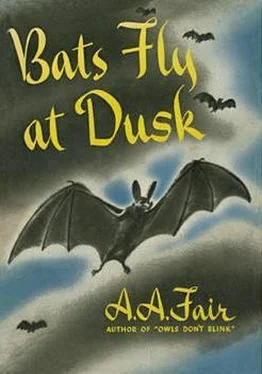Christopher Milbers said, “That is, of course, very much in the nature of a shock to me. I can hardly imagine Harlow, my beloved cousin, adopting such an attitude. However, the fact remains that we are at present engaged in searching for ten thousand dollars which seems to have mysteriously disappeared under circumstances which, at least, point the finger of suspicion—”
“Wait a minute,” Nettie Cranning said suddenly. “We don’t have to take that from you.”
Christopher Milbers smiled, the superior smirking smile of one who takes pride in a mental agility which has trapped some fellow mortal. “I have not made any specific accusation, Mrs. Cranning. The fact that you seem to resent my comments indicates that at least in your own mind—”
He was interrupted by the ringing of the doorbell.
“See who that is,” Mrs. Cranning said to her daughter.
Eva went quickly to the front door.
Christopher Milbers said, “I simply can’t believe it. It’s unfair. It’s unjust.”
“Oh, forget it,” Mrs. Cranning said. “You’ve got ten thousand bucks, and if you think that’s hay, you’re a horse.”
Paul laughed uproariously.
Bertha Cool said, “We’re still ten thousand dollars short.”
Voices sounded in the hall. Eva Hanberry came back into the room with Josephine Dell.
“Hello, folks,” Josephine called. “What do you think? I’ve got the swellest job. I’m going to work with a man who is employed by the government. He flies all over the country, and I’m going to do a lot of travelling myself. Some kind of labour investigations. He goes to one place, stays there for a month or six weeks, and then goes to some other place. Isn’t that just too grand for anything?”
Nettie Cranning said, “Wait until you’ve heard all the news.”
“Yes,” Eva said. “You’ve got some money I’ll bet you didn’t know anything about.”
“What?”
“It’s a fact,” Paul assured her. “Remember that time when the boss had us witness a will?”
“Oh, you mean the time when you were washing the car and I tapped on the window and called you in?”
“Yes.”
“That’s right, it was a will, wasn’t it? I think that’s what he said it was.”
“I’ll tell the world it was a will. You got ten thousand dollars in it.”
“I got what?” Josephine exclaimed incredulously.
“Ten thousand dollars,” Paul said.
Bertha Cool pushed the attestation clause of the will under her nose. “Is that your signature?” she asked.
“Why, yes, of course.”
“And that’s the will that you witnessed?”
“Yes.”
Milbers said, “We’ll discuss that in greater detail later on, but, in the meantime, I’m looking for the ten thousand dollars which my cousin had at the time of his death. I want to know what’s become of it.”
“Say, wait a minute,” Paul said with a cunning gleam in his eyes. “You want to know what’s become of it. Where do you get that noise? You’re talking as though you had some interest in that ten thousand dollars.”
“Well I certainly have,” Christopher Milbers said. “I’m his cousin.”
“Cousin, hell! You get ten thousand bucks under the will, and that’s all. We’re the ones that are entitled to that ten thousand dollars. We’re the ones that should get all worked up about it. It’s no put-in of yours what happens to it, and don’t forget the fact that Mrs. Cranning is the executor of the estate. I guess we’re going to quit tearing the house upside down looking for ten thousand smackers that you insinuate we’ve stolen right now. We’ll make an inventory of things in an orderly way. If we find the ten grand, we’ve found it. If we don’t it’s our loss, not yours.”
Christopher Milbers stood looking at them, swivelling his eyes from one to the other, an expression of growing dismay on his face.
“I guess you and your detective Mrs. Cool, are all done here,” Paul went on, “all washed up.”
“Paul,” Mrs. Cranning said, “you don’t need to be crude about it. However, as far as that’s Concerned, Mr. Milbers has heard the will read and it was very clear. I’m in charge.”
“That will,” Christopher Milbers declared, “is illegal. It was made under undue influence.”
Paul Hanberry laughed, a mocking, taunting laugh. “Try proving that.”
“Then it’s a forgery.”
Mrs. Cranning said, “Be careful what you say, Mr. Milbers.”
Josephine Dell said, “I’m sorry, Mr. Milbers. I don’t know what’s in the will, but, as far as the will itself is concerned, it’s absolutely genuine. I remember Mr. Milbers calling us in that day in January. Paul was washing the car outside the library, Remember, Paul? You’d backed it out in the driveway. It was right under the library window, and we could hear the hose running. Mr. Milbers went over to the safe and took out this paper. He told me that he wanted to sign a will and wanted me to be one witness, and said I’d better get one of the others as an additional witness. I asked him which one, and he said it didn’t make any difference. Then he said, ‘Isn’t that Paul washing the car out there?’ and I said, ‘Yes,’ and he said, ‘Well, tap on the window and motion for him to come in.’ ”
“That’s right,” Paul said. “And when I came in the boss said he wanted to make a will, and wanted me to sign as a witness. I didn’t pay very much attention to it, because I thought — well, you know, I didn’t think there was a dime in it for me.”
Josephine said, “I remember you were working on the car, because there was a little grease on your right hand. You got it on the paper, and Mr. Milbers—”
Christopher Milbers grabbed at the will. “Well, there’s no grease mark here,” he said.
Mrs. Cranning looked over his shoulders. For a moment she was silent with dismay.
Eva Hanberry said, “Well, a grease spot doesn’t make a will; and, besides, your recollection might be at fault, Josephine.”
“No,” Josephine Dell said firmly. “I don’t care what difference it makes or who gets hurt, I‘m going to tell the truth. There was a grease spot. If that grease spot isn’t on the paper, it isn’t genuine. Let me see my signature again.”
“Wait a minute,” Nettie Cranning said. “The grease would have been wiped off.”
“No,” Josephine said. “ I wiped it off right away with a Kleenex I took from my purse, but it left a spot and—”
“Hold it up to the light,” Nettie Cranning said. “That’s the way to tell. The grease would have soaked into the paper by this time.”
Bertha Cool, turned back the heavy blue backing on the will, held the second page up to the light. The oil had soaked through in a spot about the size of a dime.
It immediately became apparent that oil had soaked through in a spot about the size of a dime on the paper.
Josephine Dell said, “Well, I feel better about it now, because I distinctly remembered that grease spot.”
Bertha Cool said, “Now, I’m going to say something. I’m going to have a photographer come out here and make a photograph of this will while everybody’s here. I think we’re entitled to that much.”
“Personally,” Mrs. Cranning said with the suddenly assumed dignity of a woman who has inherited wealth and is making a painfully conscious effort to be a lady. “I think that is a very admirable suggestion, most compatible.”
“You mean commendable, Mother,” Eva said.
Mrs. Cranning drew herself up to her full dignity as a woman of wealth. “I said compatible, Eva, dear.”
Bertha Cool went over to the telephone and started dialing a number.
Читать дальше









